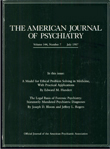Superiority of carbohydrate-deficient transferrin to gamma- glutamyltransferase in detecting relapse in alcoholism
Abstract
OBJECTIVE: The usefulness of carbohydrate-deficient transferrin is widely accepted in screening (male) population samples for heavy alcohol consumption, but its role in relapse detection is not convincingly established. The authors therefore compared the diagnostic value of carbohydrate-deficient transferrin with the commonly used gamma-glutamyltransferase in identifying relapsed alcoholics during outpatient aftercare. METHOD: The patients were 101 male alcoholics who entered a 6-month rehabilitation program after hospital detoxification. Drinking status was assessed by means of self- and collateral reports obtained during regular contacts with the rehabilitation team; relapse was defined as consumption of any alcohol. Visits occurred weekly during month 1, biweekly during month 2, and every 4 weeks during months 3-6. At every visit a blood sample was taken for measurement of carbohydrate-deficient transferrin and gamma-glutamyltransferase. RESULTS: The proportion of men who reported relapse was 25.6% per scheduled contact on average. Positive predictive values indicated that relapse was identified with a 76.2% probability by carbohydrate- deficient transferrin values above the upper normal limit, in contrast to a 32.9% chance with gamma-glutamyltransferase. Carbohydrate- deficient transferrin was especially useful in detecting early relapses during the initial rehabilitation phase, when gamma-glutamyltransferase values had not normalized. Because of the longer half-life of gamma- glutamyltransferase, it had some value with a 4-week monitoring schedule in detecting new drinking episodes in alcoholics whose previous results had been normal. CONCLUSIONS: Carbohydrate-deficient transferrin proved to be superior to gamma-glutamyltransferase in relapse detection in an outpatient care setting for alcoholics.



